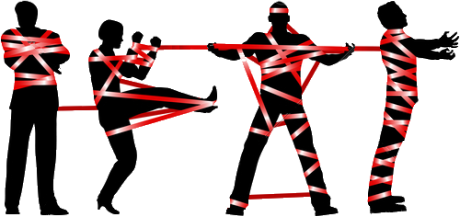Academic freedom at risk: Locking down the tech campus

The university campus is a hub of developing, breaking technology which powers the lifeblood of the academics and students working and living there. But with new laws and legislation, the true freedom to 'do as you like' in the spirit of learning, understanding and contributing to the worldwide knowledge bank could restrict this.
The HOEA legislation which was passed in 2008 is now in force, so returning and new students will be facing a 'limited service' when they begin study in the new academic year in September.
These measures are forcing universities to shape and monitor bandwidth, roll into place infrastructure filters to prevent or reduce file sharing - blocking applications, ports, protocols and websites, and ensuring DMCA notices are responded to and accepted by standard.

Though universities will rightfully respond to DMCA notices of student copyright infringement - firstly because it is illegal, and secondly it passes the blame onto the student and not to the university, which is fair, the law does not specify exactly how institutions should deal with student breaking the rules.
This is good, to the vast extent. It allows universities to pass discretion and investigate complaints, and gives them the breathing space to deal with their localised issues. Different universities will have different student demographics, meaning some areas will have little infringement whereas others will have plenty.
- Related: College students face file sharing penalties under law
- Related: Open wireless access 'outlawed' by British Government
- Related: The next generation of terrorism
If a university takes public funds paid by the taxpayer to provide the best education for the students at a lower cost to parents or students themselves, they will have to implement at least one of the measures suggested by the Department for Education or face cuts to their funding.
However there is a flip side to this. ArsTechnica reports the measures some universities, colleges and schools are implementing are at the polar-opposite end of the discretionary scale, by taking the "block first, ask questions later" approach.
What is even more terrifying is that some are rolling out deep packet inspection to screen every bit and byte of data for detecting illegally downloaded copyrighted material. By doing this, they are seriously infringing upon the privacy of the students - of which, let's not forget pay to be at these institutions, and are impacting on the ability to fully let their hair down in their academic studies.
For those not in college, this is almost exactly the same practice that Research in Motion use, by employing people and paying their staff, and in return they monitor all voice, text and email communications in and out of the company.
Universities are vast, open spaces where inexperienced students often come together, share values, discuss opinions and construct ideas. The cultural workings of campus go beyond learning an academic study. It is where values are developed, contradicted, challenged, but also bolstered and reinforced.
These measures risk the very open environment of which students and academics today need to push the boundaries of intellectual research, and puts in jeopardy the ability to develop new ideas, access any resource they require for research and take the next step in intellectual empowerment.
If universities are having their wings clipped and academics and students alike are being restricted to what they can and cannot do, by technical means to prevent a widespread problem but have negative knock-on effects impacting the legitimate, law abiding student, then academic freedom is as good as dead.